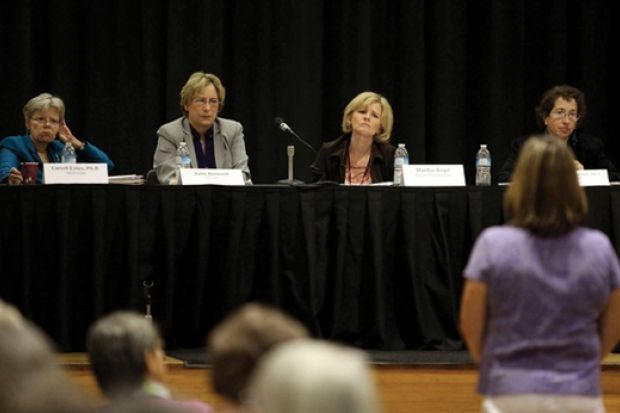Source: Getty
An equal hearing: the call for gender balance was spurred by an event listing 22 speakers, all of them men
A fierce debate over gender balance on conference panels has been ignited after UK academics and science writers joined those signing a pledge to refuse to speak at or to moderate events dominated by male contributors.
Writing in The Atlantic on 4 January, journalist Rebecca Rosen called for the pledge after observing that all 22 speakers originally listed for a web technology conference in London on 9 February were male. Three female speakers have since been confirmed.
More than 300 people signed the online pledge before it was taken down because of abusive comments being posted.
John O’Shea, former artist-in-residence at the University of Liverpool’s Clinical Engineering Research Unit and a regular on such panels, was among those signing up.
He told Times Higher Education that although the pledge was not a “magic wand”, it gave speakers the opportunity to use their power to challenge the situation. “I think that men working in all industries should be proactive in regards to this problem,” he said.
Critics suggested that the pledge could enforce tokenism, but science writer Ed Yong said the problem was not a shortage of female speakers but rather organisers’ efforts to find them. “Getting a gender-balanced panel isn’t a sign of filling quotas…or other such absurd accusations, it’s a sign of a functioning meritocratic process,” he said.
Dame Athene Donald, professor of experimental physics at the University of Cambridge, pointed out that such a pledge should “cut both ways”, with all-female panels and committees being similarly shunned.
The pledge may be having an impact. At the height of the debate, the National Union of Journalists was questioned over the all-male line-up at its forthcoming Open Access and Editorial Quality event on 6 February. Organisers say that a new speaker, Gail Cardew, director of science and education at the Royal Institution, has since been added.
Meanwhile, Research Councils UK has written to all university vice-chancellors to say that they will use their institutional visits and auditing programme to enforce improvements in university departments’ retention and promotion rates for women and ethnic minority researchers.
Rosie Beales, senior policy manager for research careers and diversity at RCUK, said the research councils were concerned about slow progress in translating policy commitments by senior managers into cultural change at departmental level.
However, she said that RCUK had decided against including in its new Statement of Expectations for Equality and Diversity, published on 17 January, a requirement for departments to obtain formal accreditation for their equality and diversity efforts, such as an Athena SWAN Charter award. Instead, research councils will compare departments’ positions on equality to the national picture and ask those below the national standard what they are doing to improve.
Ms Beales said she hoped that the research councils’ status as funders would prompt departments to take equality and diversity seriously. If departments did not, she added, RCUK would reconsider imposing a requirement for accreditation.
Register to continue
Why register?
- Registration is free and only takes a moment
- Once registered, you can read 3 articles a month
- Sign up for our newsletter
Subscribe
Or subscribe for unlimited access to:
- Unlimited access to news, views, insights & reviews
- Digital editions
- Digital access to THE’s university and college rankings analysis
Already registered or a current subscriber? Login




